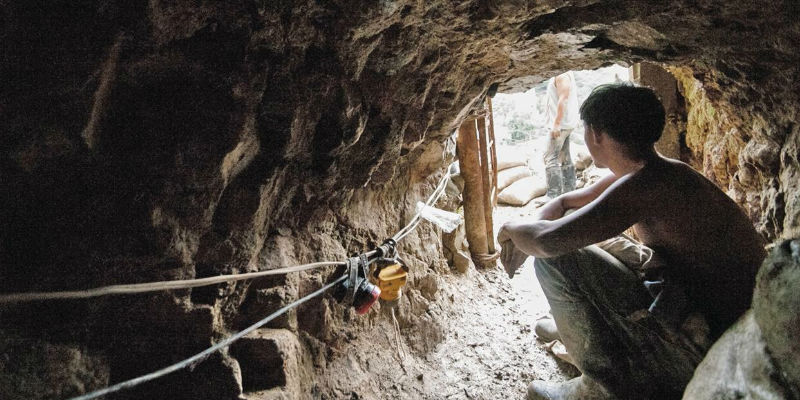BSP backs clamor for review of gold tax

POT OF GOLD A small-scale miner takes a break after taking out sacks of gold ore from a tunnel at the Acupan mines in Itogon, Benguet province. But there is still no light at the end of the tunnel for cutting taxes on gold sales. RICHARD BALONGLONG / INQUIRER NORTHERN LUZON
The Bangko Sentral ng Pilipinas (BSP) has joined the clamor for a review of the 7-percent tax on gold sales, believing that the smuggling of the precious metal out of the country could become even more rampant if the tax issue remained unresolved.
Asked to comment on criticisms of the taxes on gold sales, BSP Deputy Governor Diwa Guinigundo said there was indeed merit to the proposal for the Bureau of Internal Revenue (BIR) to soften its stance on the gold tax.
But while legislators are calling for the removal of the gold tax, the BSP’s proposal is to adjust the method of computing the taxes on gold sales.
The BSP is the one authorized to buy gold mined within the country. Proceeds of gold sold to the BSP are charged a 5-percent creditable withholding tax and a 2-percent excise tax. Said taxes are computed based on the gross amount of gold sales.
But under the current tax system, only those who directly sell gold to the BSP are taxed.
Article continues after this advertisementFrom mining sites, gold is sold from one trader to another. The last trader—the nearest to one of the BSP’s gold-buying sites and the final seller of the gold to the BSP—is the one charged by the BIR with the taxes totaling 7 percent.
Article continues after this advertisementTo ensure the immediate collection of the taxes, the BIR has set up desks in all of the five gold-buying sites of the BSP—Baguio City, Quezon City, Naga City, Davao City and Zamboanga City.
“Congress and BIR would have to work out a practical, acceptable, realistic base [rather than the gross amount of gold] on which to apply the tax rates,” Guinigundo said.
“It would appear, therefore, to be more practical to do the adjustment before the tax rates are applied. Otherwise, we might be seeing more black-market disposition of local gold in the global markets. Tax revenues would also be reduced in the process,” the BSP official added.
Because of the controversial tax, significant amounts of gold are believed to be smuggled out of the country.
The BSP admitted that the volume of gold it bought had shrunk significantly since last year, when the BIR strictly enforced the collection of taxes on gold sales by setting up desks in the BSP’s gold-buying sites.
To address the issue, Congress plans to revise the controversial gold tax together with other precious metals under the proposed reforms in revenue-sharing in the new executive order (EO) signed by President Aquino last July.
“We cannot stop the BIR from collecting the gold tax because it is the law. Congress can only change this if we enact new mining taxes under EO 79. Until then, we just hope the Bangko Sentral can replenish its gold reserves from other sources,” said Davao City Rep. Isidro T. Ungab, chair of the House ways and means committee.
Ungab said his district had a “firsthand” knowledge of the harsh effect of the gold tax on small miners at the Mount Diwalwal gold find in Compostela Valley and the Davao region, which accounts for the bulk of gold sold by small miners in the country.
“It’s a very serious issue especially in my province where the small miners prefer to sell their gold find in the black market rather than pay the 7 percent tax to the Bangko Sentral,” Ungab said.
With BIR Commissioner Kim Henares refusing to give in to calls from lawmakers to suspend the gold tax, Ungab said the government should at least ensure that it would implement it more efficiently and plug the loopholes for smuggling.
“It’s a good issue to look into. We need to control the industry. We have to check what is doable. But personally, I feel this will not be finished within this Congress,” Ungab said.
But for the Mining and Geosciences Bureau (MGB), all the government had to do was to give a little encouragement to small-scale miners and tighten up against the illegal mining of the precious metal.
“We just have to convince them that it pays to pay taxes,” MGB director Leo Jasareno told the Inquirer, adding the BSP had started meeting with small-scale miners to urge them to sell their gold to the government.
He agreed that the drop in sales of gold to the BSP was alarming. In previous years, an average of 30 tons of gold was sold annually to the BSP.
But last year, only 5 tons were sold to the BSP, mostly by large-scale mining firms, he said. “We could expect that the rest were sold by small-scale miners in the underground market.”
Environment Secretary Ramon Paje estimated the drop in gold sales to the BSP at 80 percent but would not say if it was due to the gold tax. With a report from Jeannette I. Andrade
Originally posted: 10:58 pm | Monday, November 12th, 2012